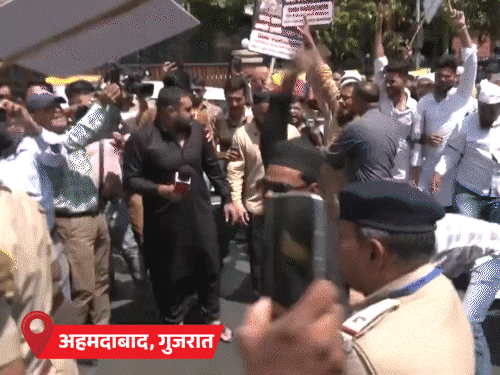- Hindi news
- National
- Waqf amendment act; Muslim Personal Law Board Modi Government | Supreme Court
New Delhi5 minutes ago
- Copy link

Protests were held in many states of the country on 8 April against the new Waqf law.
The All India Muslim Personal Law Board (AIMPLB) accused the Center of presenting wrong data in the Supreme Court in the Waqf case. The board demanded action on the officer who filed an affidavit on behalf of the Ministry of Minority Affairs to file a ‘false affidavit’.
The board has filed an affidavit in the Supreme Court on 1 May and questioned the government’s claim of 116% increase in Waqf property after 2013.
The Center had said in its affidavit filed on 25 April that by 2013 there was a total of 18 lakh 29 thousand 163.896 acres of Waqf property. But 11 years from 2014 to 2025, it increased 20 lakh 92 thousand 72.563 acres, that is, in 2025, the total Waqf property increased to more than 39 lakh acres.
Board said- 50 paragraphs on registration, center silent on the powers of the collector The board said- it seems that the Center is saying in its affidavit that all the Waqf properties registered before 2013 were uploaded immediately as soon as the WAMSI was commissioned. The number of properties shown in the column named ‘Waqf Setties in 2013’ in the affidavit is prank.
The board said- it seems that the officer who filed the affidavit did not deliberately told the court that all registered Waqf properties were uploaded on the portal in 2013. This important aspect is missing in the affidavit, so it is suspicious.
The board said that the officer who filed an affidavit should file an affidavit and stated that the number of properties shown on the portal included all registered assets by 2013.
The board has also said in its affidavit that the Center is silent about the powers of the collector in the law while there are more than 50 paragraphs on the importance of registration. Despite this, the Center did not make it clear why there was a need to remove the concept of ‘Waqf by user’ in the new law, while registering under the Waqf Act Section 36 of 1995 is already necessary.




